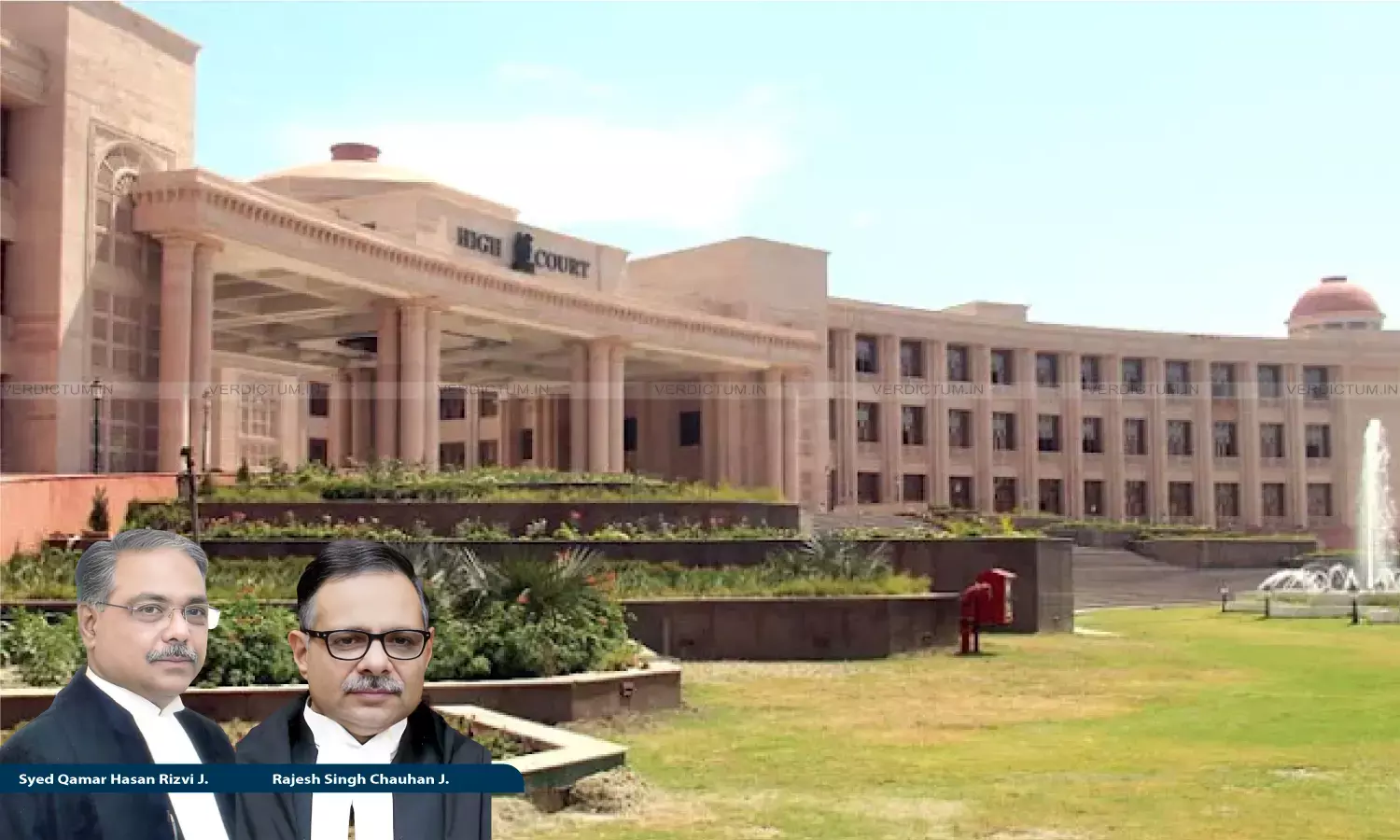Order Granting Custody Of Minor Child Passed By Child Welfare Committee Under Juvenile Justice Act Can’t Be Assailed In Habeas Corpus Petition: Allahabad High Court
The petitioner mother approached the Allahabad High Court seeking issuance of a writ or order in the nature of Habeas Corpus directing the opposite parties to produce her 11-year-old son.

Justice Syed Qamar Hasan Rizvi, Justice Rajesh Singh Chauhan, Allahabad High Court (Lucknow Bench)
The Allahabad High Court has held that when the custody of a minor child has been handed over as per the order passed by the Child Welfare Committee constituted under the Juvenile Justice Act, 2015, the said order cannot be assailed in a petition seeking a writ of habeas corpus.
The petitioner mother approached the High Court seeking issuance of a writ or order in the nature of Habeas Corpus directing the opposite parties to produce her 11-year-old son.
The Division Bench of Justice Syed Qamar Hasan Rizvi and Justice Rajesh Singh Chauhan asserted, “Having regard to the foregoing discussion, the legal position which emerges is that in a case where the custody of the petitioner corpus has been handed over as per the order passed by the ‘Child Welfare Committee’, constituted under the Juvenile Justice Act, 2015, the said order cannot be assailed in a petition seeking a writ of habeas corpus.”
Advocate Sanjeev Kumar Shukla represented the Petitioner while Governement Advocate represented the Respondent.
Factual Background
The In-charge of Rajkiya Bal Griha (Balak), Mohan Road, stated that earlier the child/corpus was placed at ‘Rajkiya Bal Griha (Balak)’, in his custody, however, currently he is boarding at ‘Dayanand Bal Sadan’. He submitted that, being the Incharge of Rajkiya Bal Griha (Balak), he has given company to the child/petitioner corpus. He informed the Court that the petitioner corpus is enjoying his life in congenial and healthy atmosphere at ‘Dayanand Bal Sadan’, Motinagar, Lucknow.
On being asked by the Court, as to whether he was willing to live with his mother who by means of the instant petition had come before the Court as a natural guardian of the child, the child outrightly refused to accept the said proposal stating that he did not like his mother as she had left him while he was just two years old. The child had also reluctanlty stated that although he had no objection in living with his father, but he would prefer to stay at ‘Dayanand Bal Sadan’, Motinagar, Lucknow where he is presently residing.
Reasoning
The Bench explained that the writ of habeas corpus would not be maintainable, if the detention in custody is pursuant to judicial orders passed by a Judicial Magistrate or a court of competent jurisdiction or by the Child Welfare Committee. It further explained that Section 27 of the Juvenile Justice Act defines the ‘Child Welfare Committee’ and provides that the State Government shall by notification in the Official Gazette constitute for every district, one or more Child Welfare Committees for exercising the powers and to discharge the duties conferred on such Committees in relation to ‘child in need of care and protection’ under the said Act.
It was reiterated by the Bench that if the corpus is found a child, as defined under Section 2(12) of the Juvenile Justice Act, 2015, he/she would fall in the category of ‘child in need of care and protection’ in view of Clauses (iii), (viii) and (xii) of Sub-section (14) of Section 2 of the Juvenile Justice Act, 2015. As per the Bench, the order passed by the Child Welfare Committee placing the corpus in a protection home would be within its power conferred under Section 37 of the Juvenile Justice Act, 2015.
“Thus, the person aggrieved by an order passed by the Child Welfare Committee can file an appeal under Section 101 of the Juvenile Justice Act, 2015. Further, the Juvenile Justice Act, 2015 provides the revisional forum before the High Court wherein the High Court may, at any time either on its own motion or an application received in this behalf, call for the record of any proceeding in which any Committee or Board or Children’s Court, or court has passed an order, for the purpose of satisfying itself as to the legality or propriety of any such order and may pass such order in relation thereto as it thinks fit”, it noted.
The Bench also held, “The order passed by the Committee pursuant to which the corpus has been sent to Children’s Home is a judicial order and hence the detention of corpus cannot be termed to be illegal. Moreover, the order passed by the Committee is appealable. Thus, the instant Habeas Corpus Petition being not maintainable is liable to be dismissed.”
Terming the present custody as not illegal or unlawful detention, the Bench dismissed the petition for a writ of habeas corpus. Noting that the father of the child had shown his serious concern regarding the wellbeing of his child and pressed for the custody of the child, the Bench granted him the liberty to file an appropriate application under the provisions of the Guardians and Wards Act, 1890 before the competent court.
On an earnest request made by the father of the child for promoting the bond between the minor child and the father in a graded manner, the Bench allowed him to visit the Children’s Home/ Dayanand Bal Sadan, to meet his child but within the premises of the same, for a period of three hours at least once a month, after seeking prior permission from the competent authority of the said Children’s Home.
Cause Title: Mayank Ojha (Minor) v. State Of U.P. (Neutral Citation: 2025:AHC-LKO:53828-DB)
Appearance
Petitioner: Advocate Sanjeev Kumar Shukla
Respondent: Government Advocate, Advocates Om Prakash Yadav, Ram Milan Yadav

